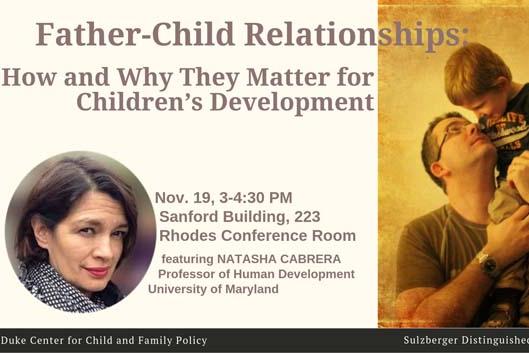
Sulzberger Distinguished Lecture
Natasha J. Cabrera, Professor of Human Development, University of Maryland
In this lecture Natasha Cabrera reviewed the empirical evidence that links father involvement to children’s developmental outcomes during early childhood. She takes a family systems perspective that fathers’ contribution to their children’s development is over and above the contribution of mothers and presents evidence for direct and indirect effects, exploring various mechanisms of influence. Cabrera placed her father-involvement research in a cultural context that has important implications for programs and policies.
Cabrera is professor of Human Development at the University of Maryland. Her research focuses on father involvement and children’s social and cognitive development; adaptive and maladaptive factors related to parenting and cultural variation in ethnic minority families; and the mechanisms linking early experiences to children’s school readiness.
Cabrera has published in peer-reviewed journals on policy, methodology, theory and the implications of fathering and mothering behaviors on child development in low-income minority families. She is the co-editor of the Handbook of Father Involvement: Multidisciplinary Perspectives, 2nd Edition (Taylor & Francis, 2013) and Latina/o Child Psychology and Mental Health: Vol 1 and 2 (Praeger, 2011). In addition, Cabrera is an associate editor of Child Development and the recipient of the National Council and Family Relations award for Best Research Article regarding men in families in 2009. In 2015, the National Academy of Sciences appointed her to its committee on parents of young children; in 2016, she was a Russell Sage Foundation Visiting Scholar; and in 2017 she was a DAAD visiting scholar at the University of Ruhr, Germany. She is co-PI at the National Center for Research on Hispanic Families and Children, co-directing the fatherhood and healthy marriage focus area.